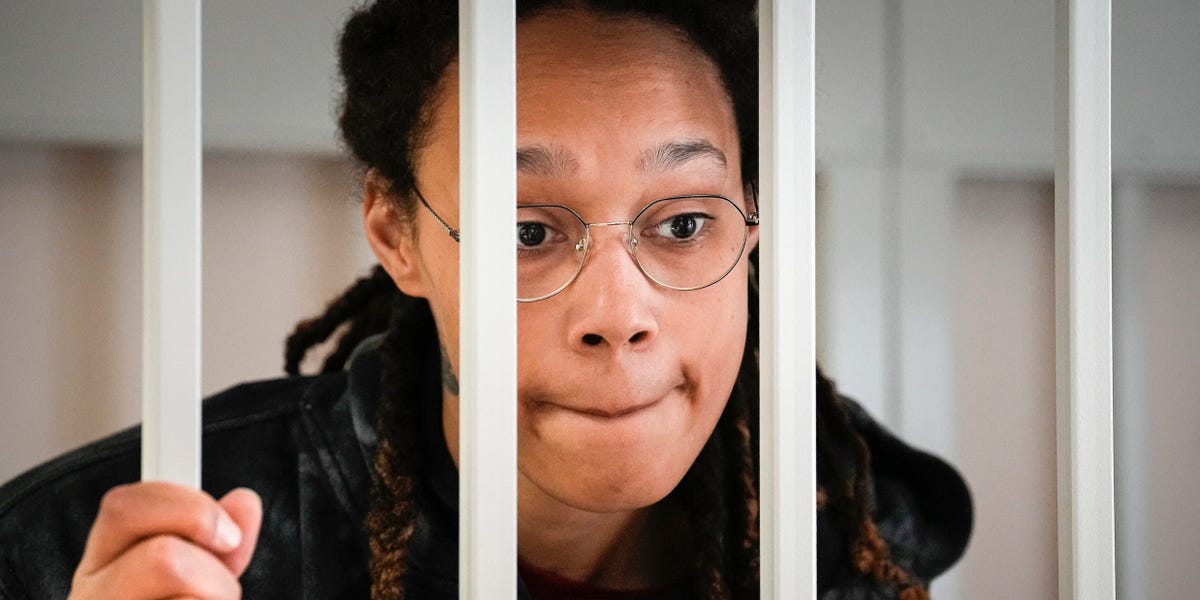- WNBA superstar Brittney Griner has been sentenced to nine years in Russian prison.
- The US government has classified her as wrongfully detained and is working to negotiate her freedom.
- Some Americans don’t want Griner to return, and a political scientist said two theories could explain why.
Some Americans are actively rooting against Brittney Griner’s return home to the United States.
The WNBA superstar was arrested in February after customs agents at Moscow’s Sheremetyevo Airport claimed they found vape cartridges containing hashish oil in her luggage. She was found guilty of drug smuggling in early August and sentenced to nine years in Russian prison.
Griner is escorted out of the courtroom after receiving her verdict and sentence.
REUTERS/Evgenia Novozhenina/Pool
Given the timing of her detention, the nature of her alleged offense, and the unjust reputation of the Russian courts, Griner is widely considered to be a political pawn Moscow is using as leverage against the United States. As such, the State Department classified Griner as wrongfully detained in May.
Even despite the “strong signal that the US government does not believe that there is a legitimate case against her,” as an expert previously told Insider, many of the two-time Olympic gold medalist’s compatriots are opposed to the Biden administration’s efforts to secure her freedom through negotiating a prisoner exchange with the Kremlin.
And there could be a scientific explanation why they’ve sided with a foreign adversary instead of supporting their fellow American.
Griner competes for Team USA at the Tokyo Olympics.
Charlie Neibergall/AP
Dani Gilbert, an expert on hostage taking and recovery who is currently a Rosenwald Fellow in US Foreign Policy and International Security at Dartmouth College’s John Sloan Dickey Center for International Understanding, told Insider her research suggests that “how someone came to be in need of assistance affects whether or not the public thinks that person should receive it.”
This phenomenon, she said, is called the “deservingness heuristic.”
Gilbert used poverty as an example for her explanation. Individuals who believe that poor people are simply “unlucky” are the ones who are willing to support programs that provide assistance. But those who deem poor people lazy are less likely to support those same programs.
Her research, which she conducted along with a colleague at the University of California San Diego, suggests that that same theory applies to the public perception of hostages and wrongfully detained individuals. Griner is no exception.
Griner is placed in her defendant’s cage during her Russian drug-smuggling trial.
AP Photo/Dmitry Serebryakov
“The fact that the American public might be really focused on the alleged drug possession and the outlandish accusation of drug smuggling might make the American public less willing to pay attention to this case.” [and] less supportive of government efforts to bring her home,” Gilbert said. “That’s the kind of dynamic that might really be in play.”
“It’s unfortunately quite predictable that Americans respond this way,” she added.
Gilbert further explained that personal characteristics could have an impact on the way the public regards Griner’s situation. Though “gender tends to be less influential in how the American public and how the media care about sympathizing with pay attention to Americans who are held hostage abroad,” than some other factors, “race is a huge deal here.”
Griner.
Evgenia Novozhenina/Pool/Reuters
This concept is aptly called “the missing white woman syndrome,” Gilbert told Insider.
“A white girl or a white woman who is taken captive or arrested or something like that elicits tons of sympathy from the American public in a way that women and girls of color do not,” she explained. “And so I think the fact that [Griner is] Black could be a huge part of the lack of attention to her case.”
“And then there are other demographic characteristics, including the fact that she is openly gay, that she is gender nonconforming, not traditionally feminine — all of these work against public sympathy for someone in her position,” Gilbert added.
Griner’s beliefs may also play a role in her perceived deservingness of spending nine years at a Russian penal colony. Though she’s not particularly political — having only cast her first vote during the 2020 presidential election — she’s received serious criticism for her views of her on the national anthem.
Griner sits on the bench as her Phoenix Mercury competes in the 2021 WNBA Finals.
AP Photo/Rick Scuteri
“I honestly feel we should not play the National Anthem during our season. I think we should take that much of a stand,” Griner told the Arizona Republic in July 2020, when many athletes knelt or stayed off the court when the anthem played in order to protest police brutality and honor Black Americans who were killed by police, including George Floyd and Breonna Taylor.
“I don’t mean that in any disrespect to our country,” she added. “My dad was in Vietnam and a law officer for 30 years. I wanted to be a cop before basketball. I do have pride for my country.”
Still, some see Griner as unpatriotic. Gilbert mentioned Facebook comments she saw that she basically said, “If you hate the United States so much, how does it feel now?”
Griner behind bars.
Alexander Zemlianichenko/Pool via REUTERS
“I think that feeds in, in a way, to the whole deservingness thing,” Gilbert said. “People decide in their minds, if someone protests or has a particular political persuasion, that suddenly means that they’re not worthy of government assistance.”
“What we should really be focused on is the fact that she was wrongfully detained and is sitting in Russian prison in illegitimate arrest,” she added. “And that any American in that situation deserves help to come home.”
